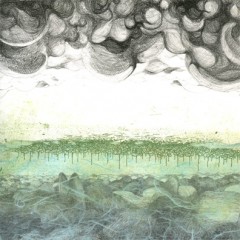Essays Michael Nagel — March 7, 2013 12:07 — 1 Comment
Dallas Area Rapid Transit – Michael Nagel
My first night in this apartment I laid awake listening to the rail bells ring, thinking I would never sleep again. The bells rang when the train came and when it left, every seven minutes, and I stared at my ceiling for hours wondering why I’d never noticed how loud this city was. Now I’ve lived here three years and I can’t hear the bells anymore. They’ve become part of my silence. I sleep just fine.Â
(In practice, silence is not the absence of sound, it is the absence of variation.)
For a while I took the DART into Dallas every Sunday night. I leaned over the tracks and watched the train appear as a speck in the distance, growing brighter as it got near. I would stand there with my bag over my shoulder, my ticket in my back pocket, and feel, briefly, like an organism within a larger organism.
(Another way to think of silence is stasis — boredom.)
The train squealed as it pulled out of the station, metal on metal, and a woman’s voice announcing the next stop. I sat next to windows and rested my forehead against the glass. The ground inched backwards as if, maybe, the earth were turning and we were standing still.
The train was never full this far north. There were always places to sit. Above the automatic doors was a map of the city — a map as it related to the train: everything in a straight line, one stop after another. I liked thinking of the city that way, simple and linear.
Movement can be a virtue in and of itself: motion for motion’s sake. I was in such a routine back then that everything had gone silent. I took the train if only for the noise.
I listened to music while the cars filled. The bike riders held their bikes in the stairwells, and the parents looked at their children, and the children looked out the windows, and the businessmen folded their arms into their chests and hunched up against the walls. On the train, everyone was equal, and when it reached the end of the line, it reversed: first became last, back became front — everything was redistributed. The train was always making itself new.
And when I said I felt like an organism within a larger organism, I meant the train made the city feel alive: movement as proof of vitality: blood flowing in the veins.
And I, I suppose, the blood.
The tracks ran behind the city, through the alleyways. You forget sometimes that buildings are just shells, that they are, by their nature, containers. Men stood out back smoking, killing time, actors off stage.
//-//
I once saw a young boy hit by this train, his bike folded in half, spit out like a wad. There were cop cars but no ambulance. Everyone stood around with their clothes moving in the wind, and I asked the man next to me what happened and he said, “A boy.” No one wanted to walk away. It was as if by walking away we would confirm this moment’s finality. It was as if by standing perfectly still this moment could later be found and erased, edited out. The train didn’t run for hours.
I met a man on this train who said his name was Jon. He was wearing a baseball hat with an unbroken brim. It was late, and by the time I got home, he had swindled me out of $40.
Someone changed the “No smoking” sign to say “No pie.” Strangers laughed together when they saw it, and I laughed too.
Riding through the tunnel between City Place and Pearl, the pressure changed and my ears popped, and Janessa’s ears popped, and we looked at each other like something had passed between us.
(I’m having a hard time connecting these things together. A train is naturally episodic, naturally interim, naturally between. It connects but is not, itself, connected.)
During the snow storm last year the tracks froze and the city shut down. A few days later, the President of DART issued a public apology for not keeping the trains running through the storm. How arrogant, I thought, to think his train could overcome nature. But then, I thought, maybe that’s the point of everything: overcoming.
Janessa and I once rode the train to the last stop, Westmoreland. There was nothing there. Some grass and some road. We walked beneath a bridge and skipped rocks on a man-made stream. We stepped over broken glass.
I never saw the boy’s body. I can’t be sure there was a body at all, come to think of it.
//-//
And on those Sunday nights after I’d wandered around Dallas, I would get back on the train and stare out the windows at my own reflection, super-imposed now over the buildings, as if I was both the city and the citizen, the body and the blood.
Everything either changes or goes silent. I don’t think the bells have stopped ringing but I have stopped noticing. And the train is not the only thing that makes itself new, that reverses and retraces its steps, that goes back and forth but never really gets anywhere.
One Comment
Leave a Reply
The answer isn't poetry, but rather language
- Richard Kenney




I am hoping to get this message to Michael Nagel. I read his article about looking for the Catholic Worker ( Jonah House) in Texas, and thought “this guy can really write… he is an authentically really good author. I am grew up loving Mark Twain, Richard Brautigan, all the best.. and was of all things an English major, but just because I love to read. You’ve got it Michael, I hope you stick at it and write the great american novellette or something. – Greg